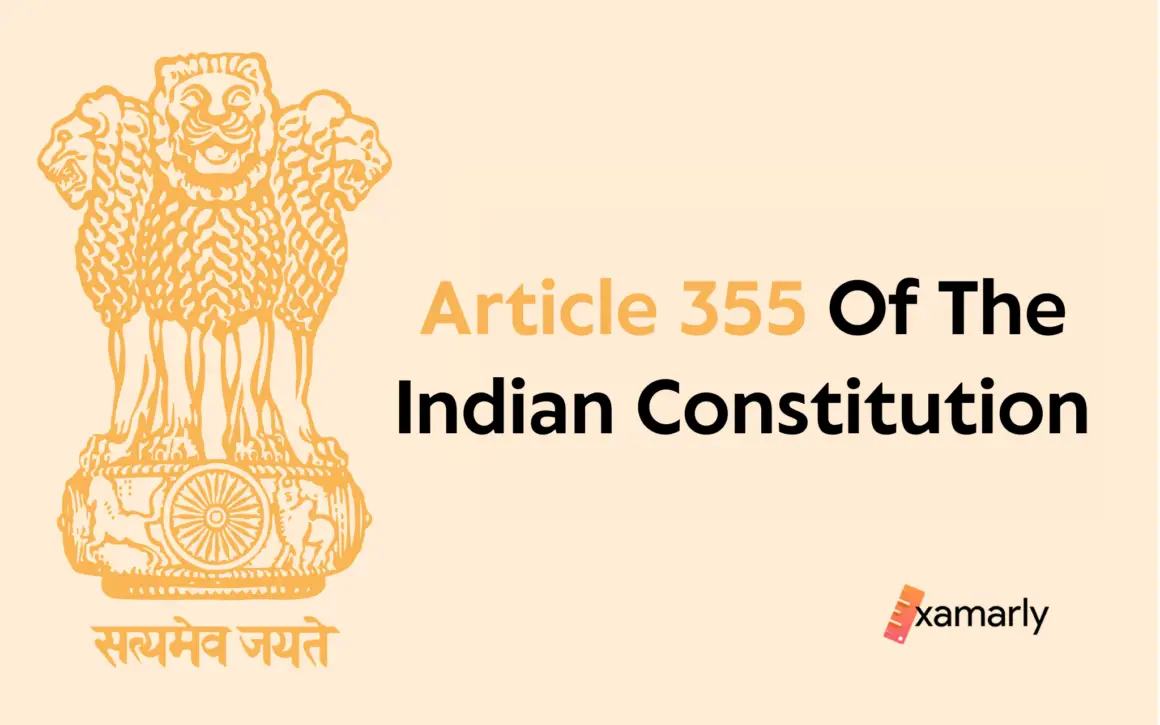Article 355 of the Indian Constitution lays out the duty of the Union government to protect states against external aggression and internal disturbance. This article is an important provision that ensures the unity and integrity of the Indian nation, by giving the central government the power to intervene in the internal affairs of a state in certain circumstances.
In this blog post, we will take a closer look at the provisions of Article 355 and its significance in maintaining national security and preserving the federal structure of the Indian government.
- Background of Article 355 of the Indian Constitution
- Article 355 of the Indian Constitution
- Additional Powers to the Union Under Article 355
- Conclusion
- FAQs Related to Article 355 of the Indian Constitution
- Which part of the Indian Constitution does Article 355 belong to?
- When was Article 355 of the Indian Constitution adopted?
- What is the purpose of Part XVIII of the Indian Constitution?
- What are the powers granted to the Union government under Article 355 of the Indian Constitution?
- Are there any controversies surrounding Article 355 of the Indian Constitution?
- What measures can the Union government take to ensure that the government of every state is carried on in accordance with the Constitution?
- Is the duty of the Union government under Article 355 of the Indian Constitution limited to specific situations?
- What are the different types of emergencies that can be declared in India according to the Constitution?
- What is a national emergency?
- What is a state emergency?
- What is a financial emergency?
- Who has the power to declare an emergency in India?
- What are the consequences of an emergency being declared?
- How long can an emergency be in effect?
- Is there a provision for judicial review of an emergency?
- How many Proclamations of Emergency have been invoked in India?
- Can a state emergency be declared without the consent of the state government?
- What are the grounds for declaring a financial emergency?
- Can a financial emergency be extended indefinitely?
Background of Article 355 of the Indian Constitution
Do you know Draft Article 277A (recognized as Article 355 of the Indian Constitution) was introduced through an amendment? Here’s a short historical background to know more about the article.
Article 355 of the Indian Constitution, previously known as Draft Article 277A, was not present in the initial Draft Constitution of 1948. However, on September 3, 1949, the Drafting Committee Chairman introduced this provision to the Constitution.
This article places an obligation on the Union government to protect states against external aggression and internal disturbance and to ensure that states function according to the Constitution. The purpose of this provision was to clarify that the Union’s intrusion into a state’s domain in an emergency would be based on constitutional obligation and not be arbitrary or capricious.
However, a member of the Assembly felt that the term “internal disturbance” was too vague and suggested replacing it with the more specific terms “internal insurrection or chaos” to prevent the Union from interfering in state affairs arbitrarily. Another member suggested replacing the conjunction “and” with “or” in the article so that the Union could interfere in a state’s function if either external aggression or internal disturbance occurred.
While some members defended the article and argued for the Union to have such powers even in non-emergency situations, all the proposed amendments were ultimately rejected and the article was adopted as it was on August 4, 1949.
Article 355 of the Indian Constitution
The Clause – As it is & Explained
It shall be the duty of the Union to protect every State against external aggression and internal disturbance and to ensure that the Government of every State is carried on in accordance with the provisions of this Constitution.
Article 355 of the Indian Constitution places a duty on the Union government to safeguard every state against external threats, such as military attacks from other countries, and internal disturbances, such as civil unrest or rebellion.
It specifies that the Union government is responsible for ensuring that the government of each state is conducted in accordance with the provisions laid out in the Constitution. This includes ensuring that the states abide by the principles of federalism and that the rights and freedoms of citizens are protected.
This provision is a crucial part of the Constitution as it guarantees the unity and integrity of the nation, by giving the central government the power to intervene in the internal affairs of a state in certain circumstances to maintain peace and order, and to ensure that the constitutional rights of citizens are protected.
Additional Powers to the Union Under Article 355
Article 355 of the Indian Constitution not only gives the Union government the power to monitor the administration of the states but also several additional powers such as:
- Power To Pass Laws On The Matters Mentioned In The State List
The Indian Constitution gives the Union government the power to pass legislation on any matter listed in the State List of the 7th Schedule if it deems it necessary for the interest of the nation. For instance, it can use Article 249 of the Indian Constitution to pass laws on matters that can aid in maintaining proper governance of states in financially challenging situations.
Article 249 of the Indian Constitution gives the Parliament the authority to legislate for the whole or any part of India with respect to any matter on the State List. Such legislation can only be considered valid if it is supported by at least two-thirds of the members of the Council of States who are present and voting along with an affirmation from The Council of States that enacting laws on that subject is necessary for the national interest.
Additionally, if Article 249 is read in conjunction with Article 251 of the Indian Constitution, it states that if there is a disagreement between legislation passed by the Parliament under Article 249 of the Indian Constitution and law passed by a State Assembly, the Union law will have the primacy to the extent of the contradiction or repugnancy.
- Power to Enforce Laws For Defence And Armed Forces
The central government has the authority to pass laws regarding the deployment and maintenance of armed troops in a state to assist the civil power, as outlined in Entry 2A of the Union List of the 7th Schedule. Even though Entries 1 and 2 in the State List give states the power to make laws related to public order and police, they are subject to the Union List Entry 2A.
Several commissions, such as the National Commission to Review the Working of the Constitution, believe that the Union’s duty under Article 355 of the Indian Constitution to provide protection to the states against foreign invasion or internal disturbance can be carried out through legislation passed under these entries.
For instance, the Central Reserve Police Force Act of 1949 and the Border Security Force Act, of 1968 give the Union government the power to intervene in the domain of the state to fulfill its obligations under Article 355 of the Indian Constitution.
- Financial Support To The States
As per Article 275 of the Indian Constitution, the Parliament has the authority to provide financial assistance to states that it deems in need. The power given to the Union under Article 275 is consistent with Article 355 of the Indian Constitution.
The final decision regarding the grant of financial aid is in the hands of the parliament. If the parliament, after assessing the current situation of a specific state, chooses to provide financial support, it has the ability to do so. The parliament can provide an appropriate amount of money, as it deems appropriate for the situation.
Conclusion
In conclusion, Article 355 of the Indian Constitution is a vital element that guarantees the unity and integrity of the country by enabling the Union government to intervene in the internal matters of a state under certain conditions.
It imposes a responsibility on the Union to safeguard every state against external aggression and internal disturbance and to guarantee that the government of each state is carried out in accordance with the provisions of the Constitution.
This article is an effective means of preserving national security and maintaining the federal structure of the Indian government. It is important to keep in mind that while Article 355 of the Indian Constitution can be beneficial in ensuring the safety and security of the nation, it should be employed sparingly and with caution.
It is essential that the Union government acts in a fair and just manner and refrains from interfering in state affairs arbitrarily. The provision should be utilized to preserve the rights and freedoms of citizens and to maintain peace and order in the country.
You Might Also Like To Read:
- Article 352 Of The Indian Constitution
- Article 353 Of The Indian Constitution
- Article 354 Of The Indian Constitution
FAQs Related to Article 355 of the Indian Constitution
Which part of the Indian Constitution does Article 355 belong to?
Article 355 of the Indian Constitution belongs to Part XVIII which is called Emergency Provisions.
When was Article 355 of the Indian Constitution adopted?
Draft Article 277A (Article 355 of the Constitution of India 1950) was adopted on 4th August 1949.
What is the purpose of Part XVIII of the Indian Constitution?
Part XVIII of the Indian Constitution deals with emergency provisions, which allow the government to take certain actions in the event of a national emergency.
What are the powers granted to the Union government under Article 355 of the Indian Constitution?
Article 355 of the Indian Constitution grants the Union government the power to protect every state against external aggression and internal disturbance and to ensure that the government of every state is carried on in accordance with the provisions of the Constitution. This includes the power to intervene in the internal affairs of a state in certain circumstances to maintain peace and order, and to ensure that the constitutional rights of citizens are protected.
Are there any controversies surrounding Article 355 of the Indian Constitution?
There have been some controversies surrounding the application of Article 355 of the Indian Constitution in practice, with some critics arguing that the Union government has used it to interfere in the internal affairs of states in an arbitrary or capricious manner or to impose its will on states. However, it is important to note that Article 355 of the Indian Constitution should be used only as a last resort and should be exercised with caution, and the Union government must act in a fair and just manner and must not interfere in state affairs arbitrarily.
What measures can the Union government take to ensure that the government of every state is carried on in accordance with the Constitution?
The Union government can take several measures to ensure that the government of every state is carried on in accordance with the Constitution, such as providing financial assistance to states in need, intervening in the internal affairs of a state in certain circumstances, and imposing President’s Rule in states where the government is not functioning in accordance with the Constitution.
Is the duty of the Union government under Article 355 of the Indian Constitution limited to specific situations?
The duty of the Union government under Article 355 of the Indian Constitution is limited to situations of external aggression and internal disturbance. In such situations, the Union government can take the necessary measures to protect states and ensure that the government of every state is carried on in accordance with the provisions of the Constitution.
What are the different types of emergencies that can be declared in India according to the Constitution?
According to the Indian Constitution, there are three types of emergencies that can be declared: national emergency, state emergency, and financial emergency.
What is a national emergency?
A national emergency is declared when the security of India or a part of its territory is threatened by war, external aggression, or armed rebellion.
What is a state emergency?
A state emergency is declared when there is a breakdown of the constitutional machinery in a state.
What is a financial emergency?
A financial emergency is declared when the financial stability or credit of India or any part of its territory is threatened.
Who has the power to declare an emergency in India?
The President of India has the power to declare an emergency, but it must be based on a written recommendation by the Cabinet.
What are the consequences of an emergency being declared?
During an emergency, the Union government can assume additional powers and assume control over the administration of states. The fundamental rights of citizens may also be restricted.
How long can an emergency be in effect?
An emergency can be in effect for a maximum of six months and can be extended with the approval of the Parliament.
Is there a provision for judicial review of an emergency?
Yes, the Indian Constitution provides for judicial review of emergency declarations, and the Supreme Court of India can examine the validity of an emergency declaration and its implementation.
How many Proclamations of Emergency have been invoked in India?
There have been three proclamations of National Emergency in India – 1st Proclamation of Emergency (India – China) in 1962, 2nd Proclamation of Emergency (India – Pakistan in 1971, and 3rd Proclamation of Emergency or Emergency by Indira Gandhi on the grounds of Internal Disturbance in 1975.
Can a state emergency be declared without the consent of the state government?
No, a state emergency can only be declared with the consent of the state government, or if the state government is unable to function as per the Constitution.
What are the grounds for declaring a financial emergency?
A financial emergency can be declared if the financial stability or credit of India or any part of its territory is threatened.
Can a financial emergency be extended indefinitely?
No, like other emergency provisions, a financial emergency can only be extended for a maximum of two months at a time, and it must be approved by the Parliament each time it is extended.






